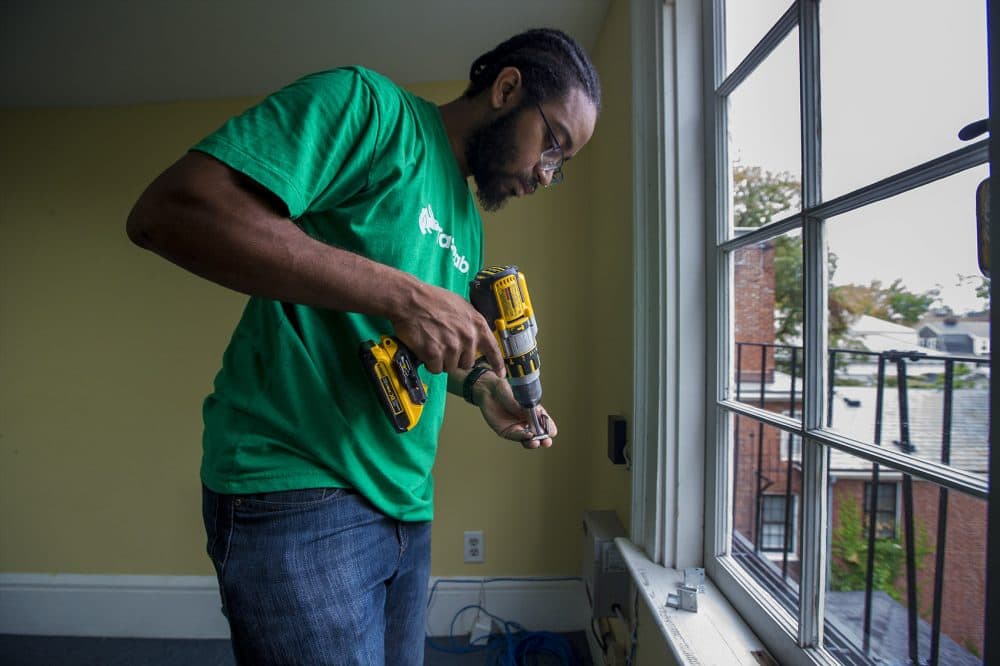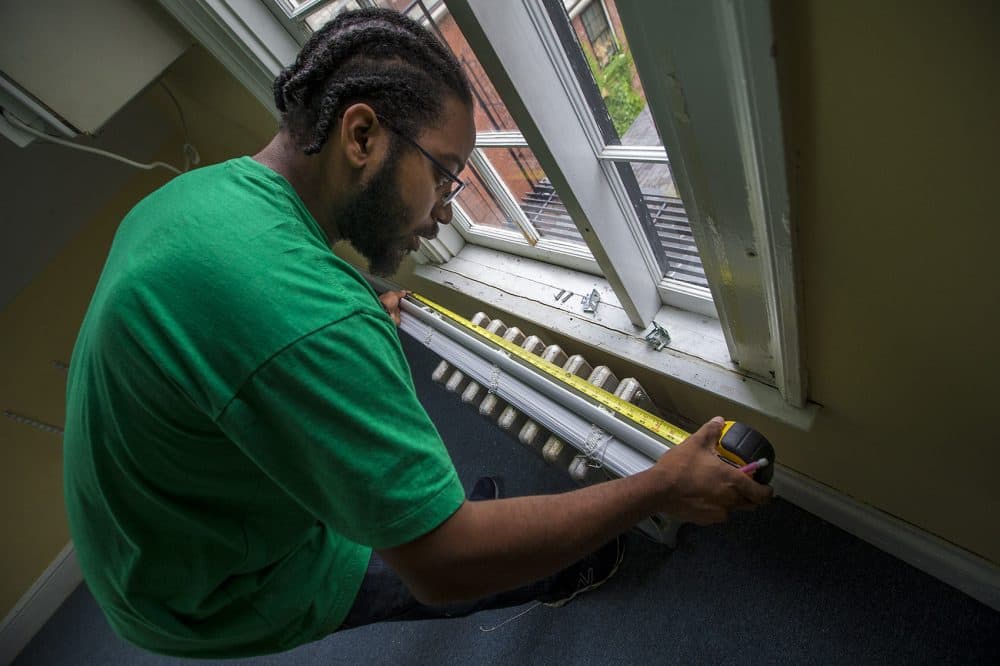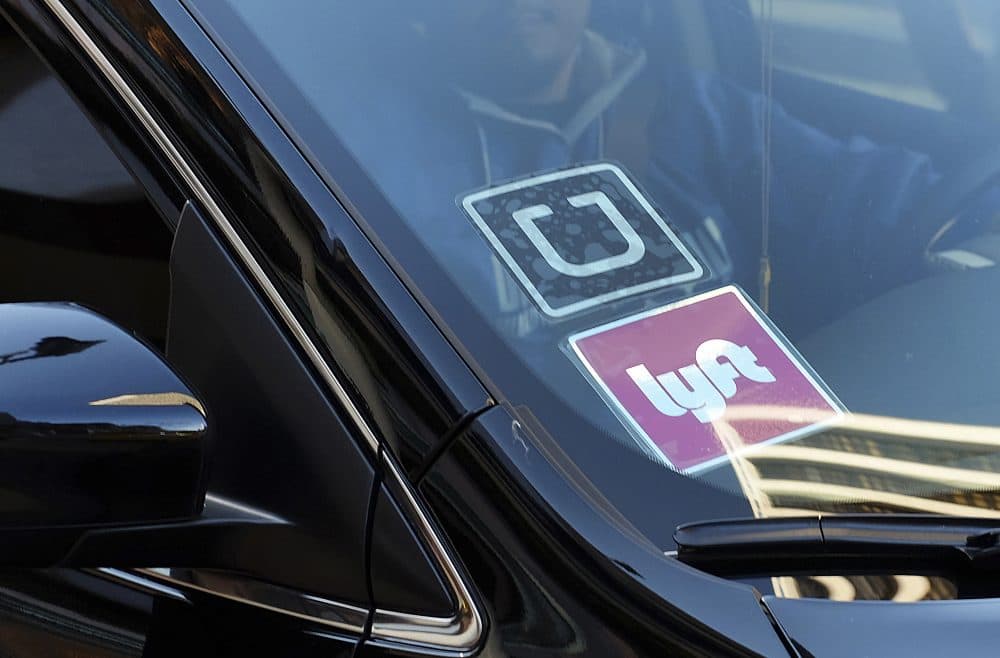Advertisement
Future Of Work
What The Booming Gig Economy Means For The Future Of Work
Resume
This story is part of a BostonomiX series called “The Future Of Work” that examines the jobs of the future and the skills needed for those jobs.
Aaron Ennis is kind of a super gig guy. He’s done Uber, Lyft and AirBnb, but TaskRabbit, which people use to find handiworkers, is now his main gig and main source of income.
"I don't work a full 40 hours a week in most weeks, Ennis says, "but it is definitely like the thing that I make the majority of my money from.”
This wasn't always the case.
The 28-year-old used to help run a computer center in Dorchester, where he lives. He made about $35,000 a year.
Now he says he makes double that by doing gigs. Like one he did on a recent afternoon in Newton.
Homeowner Eiffat Karp hired Aaron through TaskRabbit to hang a couple of oversized paintings and a large mirror over a stone fireplace.
Ennis got to work quickly, first measuring the pieces and then making small markings on the wall before using his tools to install hanging hardware.
“What I've learned through doing these is that I prefer to just kind of do my own thing, be able to meet different people, [and] have different experiences,” he says.
Ennis is part of a new wave of the gig economy that’s mostly done through tech platforms. And he’s been pretty successful at it.
Two years ago, when he did gigs through multiple companies, he cleared $100,000.
“I ended up making six figures that year, just barely, but I made it," Ennis says.
He makes less now that he’s focused only on TaskRabbit but still way more than his old 9-to-5 job.

The gig economy is booming. And some think gig work could become the norm in the future. A study released in September by the Freelancers Union and Upwork predicts freelancers will make up a majority of the U.S. workforce within a decade.
"The world of work is changing, the gig economy is here, it's here to stay, it's growing, and you best prepare to work that way," says Diane Mulcahy who teaches a class on the gig economy at Babson College.
And the gig economy is not just about tech-based platforms, like TaskRabbit. That’s less than 1 percent of the gig economy, according to a 2016 Harvard-Princeton study. The gig economy is mostly freelancers, contractors and part-time workers. That’s because companies now offer fewer full-time jobs.
"If you look at our most highly valued and high growth companies out in Silicon Valley — Facebook, Dropbox, Twilio, Twitter — they're not creating full-time jobs at the same rate as, let's say, you know, the old GEs of the day where they have 300,000 full-time employees," says Mulcahy, who has also written a book about the gig economy.
Gig work is also on the rise because people like the flexibility of it, and technology has made it easier to connect people to jobs.
"The world of work is changing, the gig economy is here, it's here to stay, it's growing and you best prepare to work that way."
Diane Mulcahy, author of 'The Gig Economy'
But not everyone makes as much as Ennis, the handyman. According to a recent estimate, most people doing gigs through tech platforms make less than $500 a month on average.
And even with Ennis' well-paying gigs, he’s had to worry about health care.
"I actually broke my collarbone a couple of years ago and had to pay for the medical stuff out of pocket," he says. "So doctor visits, X-rays and all that kind of stuff.”
Gig work does lack benefits.
Harvard economist Larry Katz is the co-author of that Harvard-Princeton study, which looked at gig work over 10 years. Katz says labor laws need to change so gig workers can access benefits.
"If you're a Hollywood superstar [or] a great athlete, being able to be on the competitive market and bargain for yourself if you have an agent, it's great," Katz says. "It's not so clear that's so great if you're highly substitutable to other workers as a janitor, a food service worker or, you know, even a physical therapist.”
This is crucial because gig work represents a huge part of employment growth. Katz says between 2005 and 2015 over 90 percent of net employment growth in the U.S. was in the gig economy.

So with more and more workers turning to this kind of employment, the lack of benefits (health care, retirement, etc.) poses major challenges for workers. There are also concerns about gig workers getting tax benefits like traditional workers.
There are some health benefits available under the Affordable Care Act. And there are efforts underway to give gig workers a safety net. There's legislation in Congress and in a few states (though not currently in Massachusetts) to create a system that would give benefits to contract or contingent workers.
Babson's Mulcahy says these efforts just put a Band-Aid on a broken system.
“I mean if you look at our labor market, it's very clear that it's set up to essentially penalize anybody that doesn't have a full-time job," Mulcahy says.
Mulcahy knows this because she herself is a gig worker. She’s an adjunct lecturer at Babson College. She’s also does consulting work. And Mulcahy thinks it’s more of a risk to have a full-time job.
"There is no such thing as job security anymore," Mulchay says. "If you look around it's quite clear that companies at any time can decide to eliminate, automate, outsource, offshore or contract out your job."
So Mulcahy says what’s really needed is a good hard look at the entire structure of our labor market.
This segment aired on November 2, 2017.
